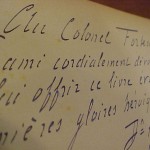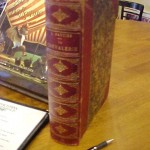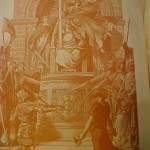Equipment in hand, they climbed the Eiffel tower, as far as they dared. It was cold and blustery – January 12, 1908 – but the men were intent on completing their bold experiment. It had been just a few months before that someone had called the device they were carrying – a radio. The name stuck.
The men believed that if they could get the transmitter higher in the air, those few folks with receiver sets might be able to hear their voices from a longer distance. It proved to be true.
It was a marvel to behold. Forget that the sound was scratchy and hard to understand. The very idea of being able to hear the actual voice of someone on the other side of the city! Remarkable! Or as they exclaimed that afternoon in Paris, “Remarquable!”
If it was the beginning of a new era, it might have been the end of another.
French writer Léon Gautier had already lamented the loss of the good old days, the knights in shining armor, the time when his country was at or near the center of all things important. It took him years to write, and when he finished, he called it: Chivalry.
That same year the men on the Eiffel tower ushered in the broadcasting era, Dr. A. Loste bought a gift for his friend Colonel Fortescue. It was a big book, worthy of a sound friendship. It was called La Chivalerie. Chivalry. At the top of the page, he penned this inscription:
Son ami cordialement de vue heureux de lui offrir le livre, evocateur des premieres gloires heroiques de la France.
It translates to: His friend is heartily glad to give him this book, evocative of the first heroic glories of France.
Ironically, the book celebrating the early glories of France wound up in a religious abbey outside London, some years later – a gift of a Father Robo. It isn’t clear how he came into possession, or how the big volume crossed the Atlantic to the US. It has migrated west from its Eastern Shore arrival all the way to Broken Arrow, Oklahoma.
The message in the book has been carried from afar to this distant point, much like that first long distance radio broadcast. The contents of the spoken message of that day atop the Eiffel tower have been lost to history, but the good doctor’s sentiments have survived intact through the penned inscription to his friend – one-hundred-six years ago.


